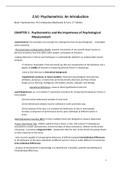2.5C- Psychometrics: An Introduction
Book: Psychometrics- An Introduction (Bacharach & Furr), 2nd edition
CHAPTER 1- Psychometrics and the Importance of Psychological
Measurement
-psychometrics- the principles and concepts for creating tests that are psychologically meaningful
and trustworthy
-The Facial Action Coding System (FACS)- pinpoint movements of very specific facial muscles to
perceive emotions/ how they affect other people´s perception of emotions
-making inferences→ that an overt behaviour is systematically related to an unobservable mental
attribute
-if inference reasonable→ then we would say that our interpretation of the behaviour has a
degree of validity (if measure is measuring what we think it is measuring)
-need to link inference to theoretical background
-hypothetical constructs or latent variables- theoretical psychological characteristics,
attributes, processes, or states that cannot be directly observed, and they include
things such as learning, intelligence, self-esteem, dreams, attitudes, and feelings
-operational definitions- measure these hypothetical constructs
-psychological test- acc. to Cronbach→ systematic procedure for comparing the behaviour of two or
more people
(1) tests involve behavioural samples of some kind
(2) the behavioural samples must be collected in some systematic way
(3) the purpose of the tests is to compare the behaviours of two or more people
(include a comparison of performance by the same individuals at different points in
time)
-Beck Depression Inventory (BDI)- 21-item multiple choice test designed to measure depression
-House-Tree-Person Test- children asked to draw a house, a tree, and a person→ drawings are
evaluated for certain characteristics, and on the basis of these evaluations, children can be sorted
into groups → produces categorical data—people who take the test can be sorted into groups based
on their responses to test items
- tests must be capable of comparing the behaviour of different people (interindividual differences)
or the behaviour of the same individuals at different points in time or under different circumstances
(intra-individual differences)
- purpose of measurement in psychology is to identify and, if possible, quantify interindividual or
intraindividual differences
1
,-types of tests- vary in content: achievement tests, aptitude tests, intelligence tests, personality
tests, attitude surveys
-vary with regard to the type of response required: open-ended tests (answer test
questions by saying anything they want in response to the questions), closed-ended
tests (answer questions by choosing among alternative answers provided in the test)
-vary according to the methods: individually administered tests, tests designed to be
administered to groups of people
-vary based on purpose of test scores: criterion referenced (seen in settings in which
a decision must be made about a person’s skill level- fixed, predetermined cutoff test
score is established, and it is used to sort people into two groups: those whose
performance exceeds the performance criterion/ those whose performance does
not; criterion cutoff scores are not determined at random- associated with a decision
criterion based on some standard or expected level of performance of people who
might take the test), norm referenced (used to compare a person’s test score with
scores from a reference sample or a normative sample- characteristics of the
reference sample are thought to be representative of some well-defined population)
- vary on time properties : speeded tests (time-limited- not expected to complete
the entire test in the allotted time, scored by counting the number of questions
answered in the allotted time period- high probability that each question will be
answered correctly, each question of comparable difficulty), power tests (not time
limited, expected to answer all the test questions scored by counting the number of
correct answers made on the test, range in difficulty)
- different terms for test: measure, instrument, scale, inventory, battery, schedule, assessment
- word battery- restricted in use to references to bundled tests (intended to be administered
together but are not necessarily designed to measure a single psychological
attribute)
- psychometrics- science concerned with evaluating the attributes of psychological tests
-attributes: (1) the type of information (in most cases, scores) generated by the use of
psychological tests
(2) the reliability of data from psychological tests
(3) issues concerning the validity of data obtained from psychological tests
- psychometry – F.Galton- focused on the variability of human characteristics, human differences=
differential psychology; founding father→ today psychometrics
-measurement of mental features→ the art of imposing measurement and number upon
operations of the mind
-challenges to measurement: compromise validity of the measure
: complexity of psychological phenomena, participant reactivity, objectivity (expectation and
bias effects), composite score, score sensitivity, apparent lack of awareness of important
psychometric inf.
- demand characteristics-changing behaviour to accommodate the researcher
2
, - social desirability- change their behaviour to try to impress the person doing the
measurement
-malingering- change their behaviour to convey a poor impression to the person
doing the measurement
- psychologists tend to rely on composite scores (total score represents the final measure of the
relevant construct) when measuring psychological attributes
- physical sciences are less likely to rely on composite scores in their measurement procedures
- useful psychometric information about the samples can be obtained only if people differ with
respect to the behaviour that we are sampling
-validation process- before concluding that the procedure is interpretable as a measure of something
, the psychologist must accumulate evidence suggesting that there is an association between the test
scores and their true levels on the measured attribute
CHAPTER 2- Scaling
- measurement- assignment of numerals to objects or events according to rules
-in psychology- events are generally samples of individuals´ behaviours
- rules refer to the scales of measurement
-scaling- way numerical values are assigned to psychological attributes
- numerals are used to represent an individual’s level of a psychological attribute
-numerical properties of identity- order, and quantity reflect the ways in which numerals represent
potential differences in psychological attributes, numerals serve simply as labels of categories
- ability to reflect sameness versus differentness by putting people into categories:
- to establish a category, the people within a category must satisfy the property of
identity
- categories must be mutually exclusive
- categories must be exhaustive
-property of order- when numerals have the property of order, they convey information about the
relative amount of an attribute that people possess (they indicate the rank order of people relative
to each other along some dimension), tells us the relative amount of differences between people
-property of quantity- when numerals have the property of quantity, they provide information about
the magnitude of differences between people
- numerals reflect real numbers- said to be continuous (can be divided into infinitely small
parts)
-referred to as scalar, metric, or cardinal, or sometimes simply as
quantitative values
3
, - when psychologists use psychological tests to measure psychological attributes, they often assume
that the test scores have the property of quantity
-number 0- reflects a state in which an attribute of an object or event has no existence (absolute
zero)/arbitrary quantity of an attribute (arbitrary zero)
- mean of a distribution of z scores will always be 0 (represents an arbitrary or relative zero)
- arbitrariness is an important concept in understanding units of measurement, and it distinguishes
between different kinds of measurement units
- unit size can be arbitrary (the specific size of a unit might be arbitrary)
- some units of measurement are not tied to any one type of object (there might be no
inherent restriction on the objects to which a unit of measurement might be applied)
- when taking a physical form, some units of measurement can be used to measure
different features of objects
- units of measurement, called standard measures, are based on arbitrary units of measurement in
all three ways when they take a physical form
- standard measures are sometimes used to measure psychological attributes (reaction
times are often used to measure various cognitive processes)
- assumption that the unit size does not change—that all units being counted are identical
- size of a measurement unit should not change as the conditions of measurement change
- controversy about the relationship between counting and measurement arises when we count
things rather than attributes
- simply counting the number of some kind of object does not qualify as a measurement; rather,
counting qualifies as measurement only when one is counting to reflect the amount of some feature
or attribute of an object
- scales of measurement:
→ nominal scale- numerals that have the property of identity are used to label observations
in which behaviours have been sorted into categories according to some
psychological attribute
- identify groups of people who share a common attribute that is not shared by
people in other groups
→ ordinal scale- numerals that have the property of order
- produce ranks in which people are ordered according to the amounts of some
attribute that they possess
→interval scale- based on numbers that represent quantitative differences between people
in terms of the attribute being measured (difference between the two scales rests
primarily on the meaning of zero)
-have arbitrary zero (does not represent the absence of any attribute)
-most tests and measures
4






